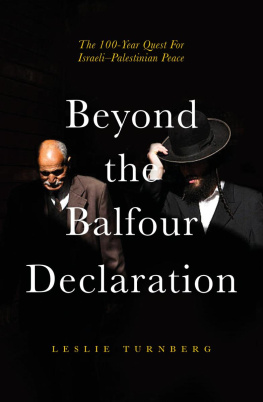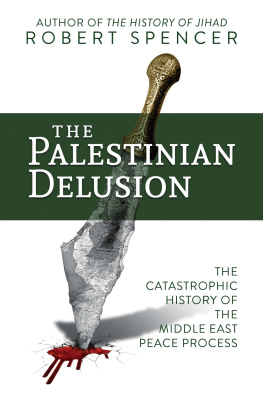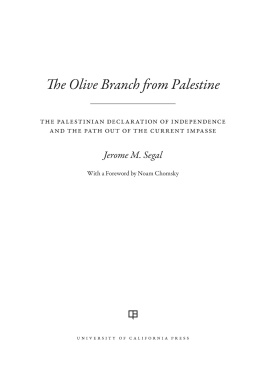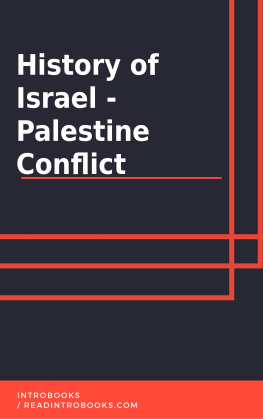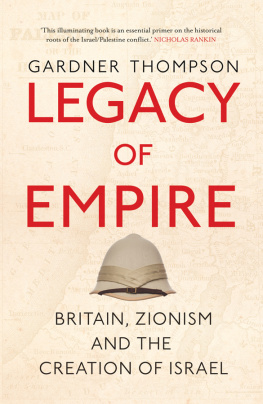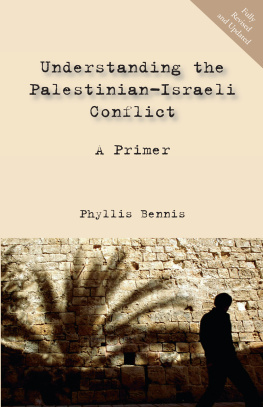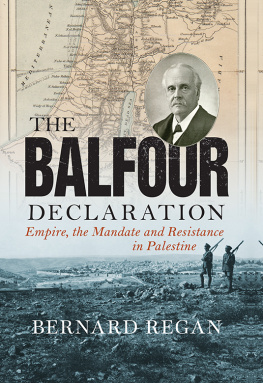THERE WAS MUCH SCEPTICISM amongst friends about the wisdom of writing a book on the IsraeliPalestinian conflict when so much had already been written. I justified entering a field rich in literature, at least to myself, on the grounds that I too needed to better understand the background. And if I was uncertain, maybe others were too.
My sense was that the centenary year of the Balfour Declaration would bring out strong views about the validity of that Declaration, and hence about the legitimacy of Israel itself. Some would feel that Balfours Declaration was the biggest error of judgement that a government could make while others would believe that it was the remarkable culmination of a desire to correct hundreds of years of injustice to a persecuted race. This is a field in which beliefs, not always based on facts, are strongly held. If I have managed to fill at least some of the gap between opinion and evidence, I will feel justified in having put pen to paper.
Needless to say I have relied heavily on many people to help me avoid too many errors of fact or judgement. It is impossible to name them all here but some stand out and I cannot fail to mention the enormous debt I owe to them.
For the fruitful conversations I have had with Jonathan Parris, Ron Prosor, Dan Schueftan, Tom Segev, and Yossi Beilin, I am truly grateful. I have had much encouragement from many individuals including Natan Sachs, Lord Roddy Balfour, Rabbi Lord Jonathan Sacks and many others.
Special thanks are due to some who have had the patience to go through my manuscripts with an eagle eye. Sir David Manning made hugely important suggestions for improvements. Shmuel Barr cast a very perceptive and critical eye on my writings, while Mustafe Abbasi helped me understand Palestinian history rather better. I thank Anton Alexander for drawing my attention to the importance of the threat of malaria in early twentieth-century Palestine. It was Gilad Eisen, however, who made line-by-line suggestions for improvement. It was he who made sure to point out my errors and without his input I feel sure that the book would have been the poorer.
Needless to say, any remaining errors and misapprehensions are entirely my own.
I am deeply grateful to all these individuals.
I am grateful to Stand with Us for allowing me to reproduce the maps on pp. xxii and xxiii.
I was delighted that the current Earl, Lord Roddy Balfour, agreed to write the Preface. It has been a privilege and a pleasure to have his support. At Biteback, my editors, Jonathan Wadman and Olivia Beattie, have been enormously supportive in shepherding me through the editing process. My gratitude to them is unbounded.
Writing has been a pleasure but it would not have been possible if I had not hidden myself away from social contact at times, not least from my wife Edna. It is to her patience, support and encouragement that I dedicate this book.
February 2017
I WAS VERY HONOURED when Leslie Turnberg asked me to compose a preface to this book, written to coincide with the 100th anniversary of the Balfour Declaration, signed by my forebear, Arthur, and Foreign Secretary at the time, in a letter to Lord Rothschild. In it, he expressed His Majestys Governments support for making the old Biblical lands of Palestine once more a home for Jewish people, a large number of whom had been evicted from Russia and elsewhere in the pogroms of the previous decades. It was this humanitarian aspect of the Declaration of which our family are most proud.
Notwithstanding this humanitarian imperative, many post-1948 commentators, after the formal creation and UN recognition of the state of Israel, have sought to blame the Declaration as the fountain of all conflict in the cauldron of the Middle East since then. Of course I have followed events in the region keenly and if ever the aphorism my enemys enemy is my friend was true then it has been there. At many times, and this probably applies to the very present, the regional conflicts have been power-mongering between the many countries and an ever-escalating struggle for supremacy between Shia and Sunni Muslims.
The Declaration never anticipated the Holocaust thirty years later or the pressures a burgeoning Palestinian population would bring to a very small area over which all the Abrahamic faiths claim viscerally felt rights. The wish expressed in the Declaration that creating a Jewish homeland should not interfere with the current inhabitants at the time has clearly been overtaken by these events and factors. Nonetheless, it is our familys sincere hope that some resolution can be found for the problem, which will probably require much shuttle diplomacy, some giving of ground by Israel and some arm-twisting of the Palestinian militants (most of whom are sworn to destroy Israel) by neighbouring Arab states.
Of course this has all been tried before, and written about, but for myself, finding a book which deals with the whole of the past 100 years and which is concise and readable has too often found me putting down a tome which isolated a period of time and was likely to be verbose as a result.
Thus it was that when I was introduced to Leslie he told me he was writing this book and offered it to me to read in its raw draft form. I was immediately drawn to his style and his pinpointing of key moments and the circumstances building up to them or their after-effects. He maintains a wonderful pace to keep the reader from getting bogged down and it is his enormous research and ability to winnow out the unimportant which make the book so readable to somebody like myself, an average reader and student of current affairs and history. I commend it to anybody who feels that getting a good understanding of the machinations surrounding Palestine in the last 100 years is just too big a task to undertake. Leslie Turnberg has done all the heavy-lifting for that reader.
The 5th Earl of Balfour
February 2017
SATURDAY EVENING, 4 NOVEMBER 1995, and Yitzhak Rabin, Prime Minister of Israel, is being given an enthusiastic reception by 100,000 Israelis. They are gathered in Tel Aviv at the rally in support of his peace initiatives. He is elated and hugely encouraged. He steps down from the platform with Shimon Peres a few steps behind him and heads for the bulky armoured Cadillac waiting to take him away. The security guards have been casually watching the crowds, missing a young Jewish student, Yigal Amir, standing patiently nearby and are slow to react when he walks behind Rabin, pulls out his gun and shoots him three times in the back. It is a miracle that Rabins wife, Leah, at the last moment persuaded him to wear the bullet-proof vest he had resisted for so long. He falls to the ground, shaken and bruised, but is otherwise unhurt. He is quickly helped into his car and driven away.
It is then that he realises how fragile the peace process is and how quickly it could be destroyed by an act of terror.
Rabin strengthens his determination to move rapidly to full statehood for the Palestinians from the limited autonomy accepted after the Oslo agreements of 1993. The architect of Oslo, Yossi Beilin, is by now able to present him with a worked-up plan that has been agreed in further secret meetings with Mahmood Abbas of the PLO: Palestinian statehood on the West Bank and Gaza, withdrawal from all Israeli settlements apart from those immediately adjacent to the border with an equal area of Israeli land given over in compensation, acceptable security arrangements for Israel, part of East Jerusalem to be ceded to the new state and a limited return of refugees with compensation for others.

